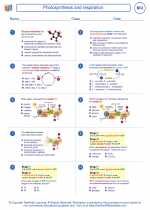Cell Wall
The cell wall is a rigid, protective layer that surrounds the cells of plants, algae, fungi, and some bacteria. It provides structural support and protection for the cell, and also helps maintain the shape of the cell.
Composition of Cell Wall
The cell wall is primarily composed of cellulose, a complex carbohydrate that forms long, fibrous chains. In addition to cellulose, the cell wall may also contain other polysaccharides, proteins, and inorganic compounds like calcium carbonate.
Functions of Cell Wall
- Structural Support: The cell wall provides structural support and rigidity to the cell, helping it maintain its shape and resist mechanical stress.
- Protection: It acts as a barrier, protecting the cell from physical damage, pathogens, and dehydration.
- Regulation of Water: The cell wall allows for the passage of water and nutrients into and out of the cell, helping to maintain turgor pressure and overall cell hydration.
- Cell Communication: The cell wall contains channels and pits that allow for communication between adjacent cells, facilitating the exchange of signals and molecules.
Differences in Cell Wall Composition
While plant cell walls are primarily made of cellulose, the cell walls of fungi contain chitin, a tough, nitrogen-containing polysaccharide. Bacterial cell walls can be classified into two main types: those with a peptidoglycan layer (gram-positive bacteria) and those with both peptidoglycan and an outer membrane (gram-negative bacteria).
Study Tips
- Compare and contrast the composition and functions of cell walls in plants, fungi, and bacteria.
- Learn the structural organization of cellulose and its role in providing strength and rigidity to the cell wall.
- Understand the significance of the cell wall in terms of plant growth, development, and interactions with the environment.
- Explore the implications of cell wall-related research in biotechnology, agriculture, and medicine.
[Cell Wall] Related Worksheets and Study Guides:
.◂Biology Worksheets and Study Guides High School. Photosynthesis and respiration

 Worksheet/Answer key
Worksheet/Answer key
 Worksheet/Answer key
Worksheet/Answer key
 Worksheet/Answer key
Worksheet/Answer key
 Vocabulary/Answer key
Vocabulary/Answer key
 Vocabulary/Answer key
Vocabulary/Answer key
